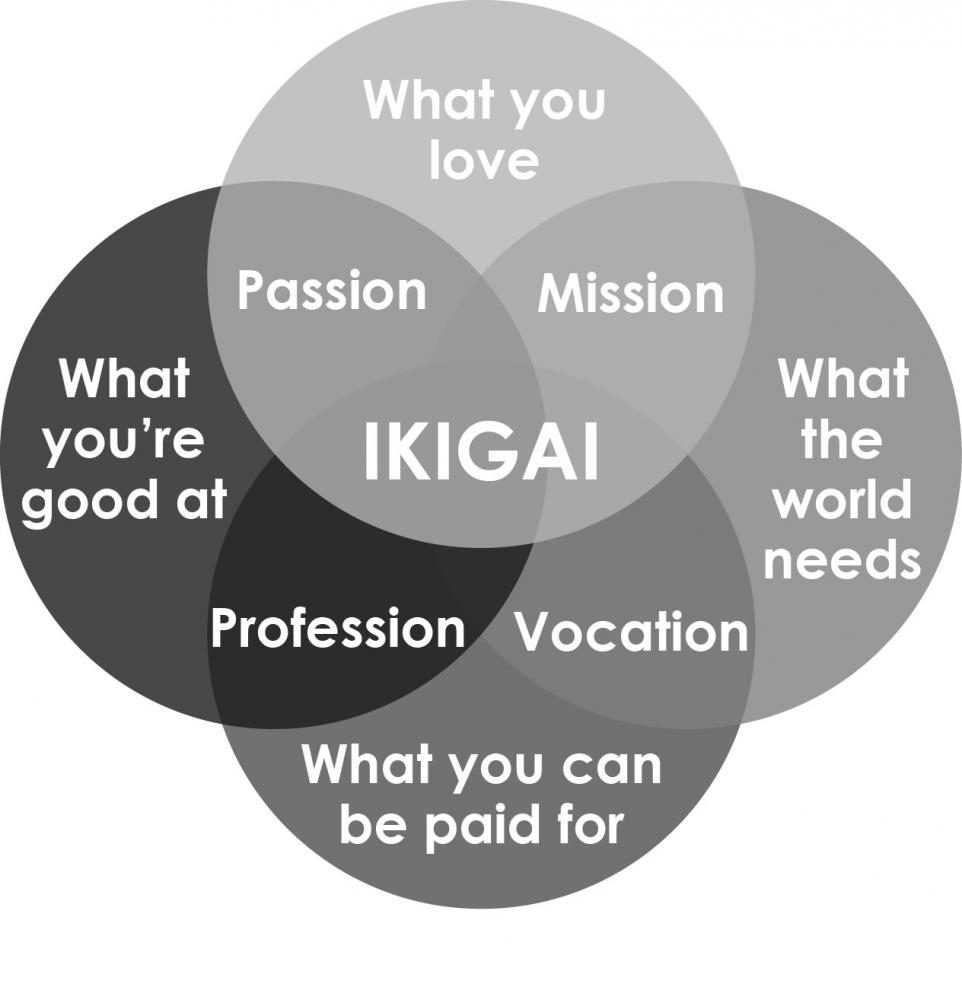Don’t follow your passion, it could poison you
The cliché phrase “follow your passion” is deceptive
Aloni Martin | The Daily Evergreen
Ikigai is a person’s calling; it is the combination of passion, societal need, being able to provide for yourself, and what you are skilled at.
August 24, 2017
Follow your passion. This phrase, commonly uttered to high school and college students alike, is one of the most misleading bits of advice they can receive.
Usually doing what one loves is a good thing, people ought to be happy with the path they have chosen, but making happiness seem like an inseparable prerequisite to success can lead to unreasonable expectations and a whole lot more undue misery than one might expect.
If a person hasn’t yet discovered or developed their passion fully, this advice can feel like an impossible request, like asking someone to find their way in the dark and assuming they have a light to guide them. Asking students to follow their passion from the very beginning can result in undecided individuals feeling unsure of themselves and wondering where to start if they want to achieve their goals.
“I think it is more about finding something you enjoy and can mix with your hobbies rather than picking the one thing you love and only doing that,” WSU Orientation Counselor Lily Voynick said about her experience when she was choosing a major.
This is important for several reasons, but chief among them is the necessity to explore different avenues to fulfillment.
“Follow your passion” is a dangerous assumption that creates the impression that students ought to love every moment of their work. Not only is this unrealistic, but it also doesn’t allow people to grow to love the career they are pursuing.
In the context of higher education programs, the idea that a person should enjoy every moment of learning supports the misconception that if people aren’t enjoying a program, it must be because that major is not the one they should be pursuing.
Terese King is the director of the Academic Success Career Center (ASCC) at WSU. As the ASCC director, King is responsible for coordinating a number of events on campus and advising undecided students. “Definitely follow your passion but be realistic about what that’s going to bring to you,” she said. “You have to look at what your talent is and what your skills are in that area.”
Aptitude is another reason why following passion is not necessarily the best first advice to hear. Having skills matters, often just as much as how enjoyable the activity is. A person has to be good at a job in order to turn it into a sustainable career.
“Sometimes you have to pay your dues, you know?” King said, “You have to start somewhere and that may mean you are in a position that you don’t necessarily like but it’s going to lead to something else.”
So, if having a passion for one’s work is not the most important aspect of selecting a major or career, what is? The answer could be found in the Japanese idea of Ikigai.
Ikigai is the Japanese concept meaning, “the reason for being.” While it does include doing what you love, that is only one of four required components to achieve Ikigai. The others include what you are good at, what you can be paid for, and perhaps most importantly, what the world needs.
This model is a deeper and more effective criteria to take into account than just prioritizing something which you love doing. This balanced approach can lead to a more balanced life, where individuals are not shackled by a need to feel happy and enthusiastic all the time.
Learning is tough, college is tough, life is tough, there’s no reason to hide from that. We should embrace the struggle of revealing our true selves and allowing them to change, not succumb to the poisons of passion.









